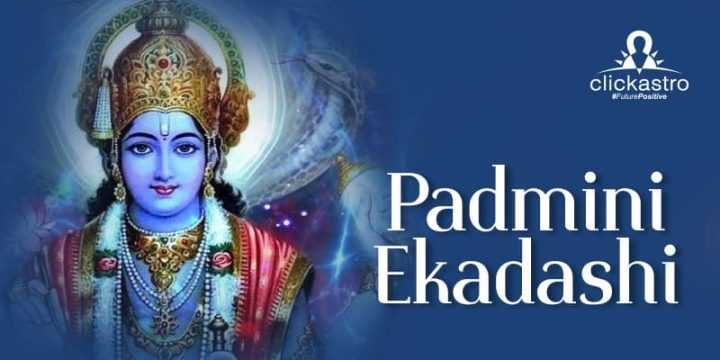Padmini Ekadashi 2023
Padmini Ekadashi, also known as Adhika Masa Ekadashi or Purushottam Ekadashi, is a significant day of fasting and devotion in the Hindu calendar. It falls during the leap month, also known as Adhik Maas or Purushottam Maas. It is a time when devotees observe a sacred fast and engage in various rituals and prayers to seek blessings and spiritual upliftment.
- Padmini Ekadashi 2023 is on Saturday, July 29.
- Ekadashi Tithi Begins – 01:21 PM on Jul 28, 2023
- Ekadashi Tithi Ends – 11:35 AM on Jul 29, 2023
- On 30th July Parana Time – 05:46 AM to 08:26 AM
Throughout this blog, we will explore the legends associated with Padmini Ekadashi, the rituals and customs followed during this auspicious day, and the importance of observing this Ekadashi in 2023. By understanding the essence and practices of Padmini Ekadashi, we can deepen our spiritual connection and experience the blessings that this day brings. So, let us embark on a journey to discover the significance and rituals of Padmini Ekadashi in the year 2023, and how it can enrich our lives with divine grace and spiritual fulfillment.
Read about
Adhik Maas Skanda Sashti
The Significance of Padmini Ekadashi
The significance of Padmini Ekadashi lies in its association with the leaped month, also known as Adhik Maas or Purushottam Maas. Unlike other Ekadashis that have a fixed lunar month, Padmini Ekadashi’s date is determined based on the occurrence of the leaped month in the Hindu lunar calendar.
The leaped month is an additional month added to the lunar calendar every few years to synchronize it with the solar calendar. It is considered a highly auspicious month for spiritual practices, penance, and observing Ekadashi fasts. Padmini Ekadashi is one such Ekadashi that falls during the
Shukla Paksha (waxing phase of the moon) of the leaped month.
The absence of a fixed lunar month for Padmini Ekadashi adds to its uniqueness and makes it a special occasion for devotees. It allows them to align their spiritual practices with the sacred energies of the leaped month, enhancing the potency of their prayers and observances.
On this day, devotees observe fasting, engage in prayers, and seek the blessings of Lord Vishnu. The rituals and customs followed during Padmini Ekadashi are similar to other Ekadashis, including waking up early, taking a holy bath,
performing puja (worship), reciting sacred texts, and offering flowers, fruits, and sweets to the deity.
By observing Padmini Ekadashi, devotees believe they can purify their mind, body, and soul, seek forgiveness for past deeds, and attain the grace and blessings of Lord Vishnu. It is a day of deep spiritual introspection, devotion, and surrender to the divine.
The connection between Padmini Ekadashi and the leaped month amplifies the spiritual significance and the opportunity for devotees to deepen their spiritual practice and connect with the divine energies. It is a time of spiritual renewal, seeking forgiveness, and invoking divine grace for a blessed and prosperous life.
Rituals of Padmini Ekadashi
Early Morning Bath:
Devotees wake up early in the morning, before sunrise, and take a purifying bath. This bath symbolizes the purification of the body and mind, preparing oneself for the day’s spiritual practices.
Observing Fasting:
On Padmini Ekadashi, devotees observe a strict fast throughout the day. They abstain from consuming certain foods such as rice, urad dal, spinach, honey, and others. This fasting is believed to purify the body and mind, promoting spiritual growth and devotion.
Prayers and Worship:
Devotees engage in prayers and worship to Lord Vishnu and Goddess Lakshmi, seeking their blessings and grace. They create a sacred altar or shrine and decorate it with flowers, incense, and lamps. Offerings of fruits, sweets, and Panchamrit (a mixture of milk, curd, ghee, honey, and sugar) are made to the deities.
Recitation of Sacred Texts:
Reciting sacred texts holds great significance on Padmini Ekadashi. Devotees often recite the Vishnu Sahasranama (the thousand names of Lord Vishnu) and the Narayan Stotra (praises of Lord Vishnu) to invoke divine blessings and express their devotion.
Temple Visit:
It is considered auspicious to visit temples dedicated to Lord Vishnu on Padmini Ekadashi. Devotees offer their prayers, perform rituals, and seek the blessings of the deity. Temples are adorned with beautiful decorations, and special ceremonies may take place to commemorate the occasion.
Charity and Donations:
As a part of their observance, devotees may engage in acts of charity and donations. Giving food, clothes, or other essentials to the needy is believed to earn merit and bring blessings.
Padmini Ekadashi story
During the Treta Yuga, there was a mighty king named Kartavirya who ruled over his kingdom soundly and fairly. He had a strong desire to have a son who could continue his dynasty and bring glory to his lineage.
In pursuit of this desire, King Kartavirya and his queen, Padmini, embarked on a journey of intense penance and austerities. They performed rigorous spiritual practices and sought the blessings of various sages and deities. However, despite their efforts, they were unable to conceive a child.
Filled with deep longing and desperation, King Kartavirya and Queen Padmini came across the revered sage Anasuya. They approached her and shared their predicament, seeking her guidance and blessings to fulfill their desire for a child.
Sage Anasuya, known for her profound wisdom and spiritual insight, empathized with their situation. She advised the king and queen to observe two Ekadashis during the Adhik Maas, the leaped month in the Hindu lunar calendar. Anasuya explained that these Ekadashis held immense spiritual potency and could fulfill their heartfelt desire for a child.
Following the sage’s instructions, King Kartavirya and Queen Padmini faithfully observed the prescribed Ekadashi fasts during the Adhik Maas. Their devotion, discipline, and unwavering faith in the divine blessings of Ekadashi fasting were rewarded by the divine grace of Lord Vishnu.
As a result of their sincere observance, King Kartavirya and Queen Padmini were blessed with a son named Kartaviryarjuna. The child grew up to be a powerful and virtuous king, known for his extraordinary strength and wisdom. He accomplished great feats, including defeating and imprisoning the mighty demon king Ravana.
This story highlights the significance of Padmini Ekadashi and the power of fasting and devotion. It emphasizes the belief that observing Ekadashi fasts during the auspicious Adhik Maas can bestow blessings, fulfill desires, and bring about positive transformations in one’s life.
Devotees who observe Padmini Ekadashi in remembrance of this story seek to invoke the divine blessings and grace of Lord Vishnu. They strive to replicate the devotion and determination shown by King Kartavirya and Queen Padmini, in the hope of experiencing similar divine interventions and spiritual upliftment in their own lives.
Significance of Purushottam Month
Padmini Ekadashi falls within the leaped month known as Purushottam Maas or Adhik Maas. This additional month is added to the lunar calendar periodically to align it with the solar calendar, ensuring the accurate synchronization of celestial events and seasons. Purushottam Maas is considered highly auspicious and holds great significance for spiritual practices and observances.
During Purushottam Maas, various religious activities, rituals, and fasting are undertaken by devotees to deepen their spiritual connection and seek divine blessings. Observing Ekadashi during this sacred month is believed to yield the benefits of a regular Ekadashi fast, amplifying its spiritual potency.
Devotees consider Purushottam Maas as a unique opportunity for spiritual growth and redemption. It is believed that any virtuous deeds performed during this month carry multiplied rewards, and the impact of spiritual practices is heightened.
Observing Ekadashi, a day dedicated to fasting and devotion, during Purushottam Maas is considered especially auspicious. The significance of Ekadashi is intensified, and the benefits derived from observing it are believed to be manifold.
By observing Ekadashi fast during Purushottam Maas, devotees aim to purify their mind, body, and soul, seek forgiveness for past misdeeds, and strengthen their connection with the divine. They engage in prayer, meditation, and self-reflection, focusing on spiritual growth and the development of virtues.
The fast during Purushottam Maas Ekadashi involves abstaining from food and water for the entire day. Some devotees may observe a strict fast, consuming only water or milk, while others may follow a partial fast, consuming light and sattvic (pure) food.
The spiritual practices during Purushottam Maas and Padmini Ekadashi are believed to bring about various benefits, including liberation from past sins, spiritual purification, and the bestowal of divine blessings. It is an opportunity for devotees to intensify their devotion, seek divine guidance, and make progress on their spiritual path.
Conclusion
Padmini Ekadashi holds immense significance for Hindus as a sacred day of fasting and devotion to Lord Vishnu. The legends associated with this Ekadashi emphasize the power of faith and the blessings received through observing the prescribed rituals.
By observing Padmini Ekadashi, devotees seek spiritual purification, the fulfillment of wishes, and a place in the abode of Lord Vishnu. The rituals and customs followed on this day, such as fasting, prayers, and offerings, are believed to invoke divine blessings and grace.
The observance of Padmini Ekadashi is an opportunity for devotees to deepen their spiritual connection, seek forgiveness for past actions, and express their devotion to Lord Vishnu. It is a time for self-reflection, introspection, and surrender to the divine will.
May this auspicious day bring peace, prosperity, and divine blessings to all those who observe it with reverence. As devotees engage in the rituals and practices of Padmini Ekadashi, may they experience spiritual purification, the fulfillment of their heartfelt desires, and a deeper connection with the divine energy of Lord Vishnu.








